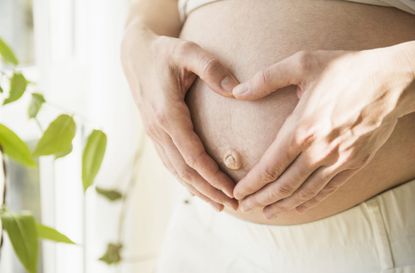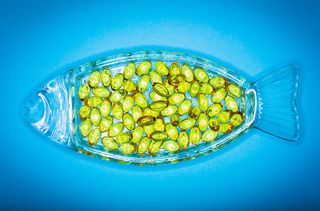Experts explain why vitamin D is important for pregnant women
According to a recent study, a vitamin D deficiency can mean women who have miscarried in the past may be at a greater risk of another pregnancy loss.

According to a recent study, a vitamin D deficiency can mean women who have miscarried in the past may be at a greater risk of another pregnancy loss.
The study, from the US National Institutes of Health, analysed 1,200 women and measured their blood levels of the essential vitamin before pregnancy and again eight weeks into their pregnancy, in order to identify signs of potential deficiencies.
Results showed that maintaining healthy levels of vitamin D – classified in this study as 30 nanograms per millilitre or higher – prior to conception resulted in women being 15 per cent more likely to carry the child successfully to term, compared to those with insufficient levels of the vitamin.
‘Our findings suggest that vitamin D may play a protective role in pregnancy,’ Dr Sunni Mumford from the National Institute of Child Health and Human Development said.
What is vitamin D?
It's a hormone that our body receives from sunlight, food or supplements. It’s important for good overall health and strong and healthy bones.
It’s also an important factor in making sure your muscles, heart, lungs and brain work well and that your body can fight infection.

Why is vitamin D so important for pregnant women?
Vitamin D is an important part of anyone’s diet, regardless of whether you are pregnant or not.
GoodtoKnow Newsletter
Parenting advice, hot topics, best buys and family finance tips delivered straight to your inbox.
But in expectant mothers it is especially important for providing key nutrients, like calcium and phosphate, which help your baby build strong and healthy bones, teeth and muscles.
Deficiencies can cause bone weakness and deformities, particularly in children who are growing rapidly where it can lead to rickets – a skeletal disorder that can cause weak and soft bones, stunted growth and in severe cases, skeletal deformities.
Vitamin D deficiency has been highlighted by the government as a serious concern for babies, children and adults of all ages, thanks in part to the lack of sunshine in the UK.
Nutritionist Shona Wilkinson explained to GoodtoKnow: ‘We know that vitamin D plays an important role in a healthy pregnancy which is why the Government recommends that all adults should consider taking a vitamin D supplement especially during Autumn and Winter.’

But as Shona advises, it is especially important to know if you have a deficiency if you are trying for a baby.
‘Vitamin D deficiency can have a detrimental effect on placental development and embryo implantation,’ she said.
‘We know that many people in the UK are deficient so it would be wise to know your levels before trying for a baby or while you are pregnant.’
How to tell if you have a vitamin D deficiency
Vitamin D deficiency is actually very common with around one in five being affected in the UK, with more in the winter, according to Dr Ross Perry, GP and Medical Director of CosmedicsUK.
The most common symptoms to look out for include general tiredness, aches and pains and not feeling right. In more severe cases, there can be pain or weakness.
If you are in doubt about your levels, ask your GP for a blood test. If the test reveals that you are deficient, your levels will be very low indeed.
‘You may be tempted to sit in the sun more, but this is unlikely to resolve a serious vitamin D deficiency, plus exposes you to the risks of sun damage,’ Dr Ross told GoodtoKnow.
‘A GP will normally prescribe high dose vitamin D supplements to redress the levels,’ he added.
What’s the treatment for a vitamin D deficiency?
‘Sun exposure is the best way to maintain our vitamin D levels. It does not need to be sunburn or a tan but simple exposure of arms and legs 2-3 times a week for 15-20mins will suffice,’ advises Dr Ross.
‘Human skin can make large amounts of vitamin D when lots of skin is exposed and the sun is high in the sky. Your body is designed to get the vitamin D it needs by producing it when your bare skin is exposed to sunlight,’ he added.

But what can you do if there isn’t much sun?
Another way you can increase your vitamin intake is by eating certain foods, such as: oily fish like salmon, sardines and mackerel, eggs, fortified fat spreads, fortified breakfast cereals and some powdered milks – vitamin D is added to all infant formula milk.
As vitamin D is found in only a small number of foods, whether naturally or added, it might be difficult to get enough from foods alone.
It’s a good idea then to take a daily supplement containing 10 micrograms of vitamin D, especially if you are pregnant, breastfeeding or trying to conceive.
Most pregnancy multivitamins contain the essential vitamin. Or, if you prefer, you can take a single vitamin D supplement.
Only take a multivitamin that's made specifically for pregnancy, and check the label to see how much vitamin D it contains. Ask your pharmacist, midwife or doctor if you're not sure which one is suitable.
A Freelance Writer and Content Editor, Jenni has been working on the women's lifestyle team at TI-Media on and off for over three years. She writes about your favourite celebrities and TV shows so you never miss an update. Jenni also writes beauty news and features - so for all of your skincare and make-up needs, drop her a line.
-
 Compromising may be killing your relationship - here are 5 ways to reach healthy compromises, according to relationship expert
Compromising may be killing your relationship - here are 5 ways to reach healthy compromises, according to relationship expertCompromising isn't always the best way to keep the peace in a relationship
By Charlie Elizabeth Culverhouse Published
-
 Best interactive pets for kids: 15 gift ideas for children of all ages
Best interactive pets for kids: 15 gift ideas for children of all agesFrom puppies to axolotls, take a look at our selection of the best interactive pets you can buy that are sure to be a hit with little animal lovers
By Sarah Handley Published